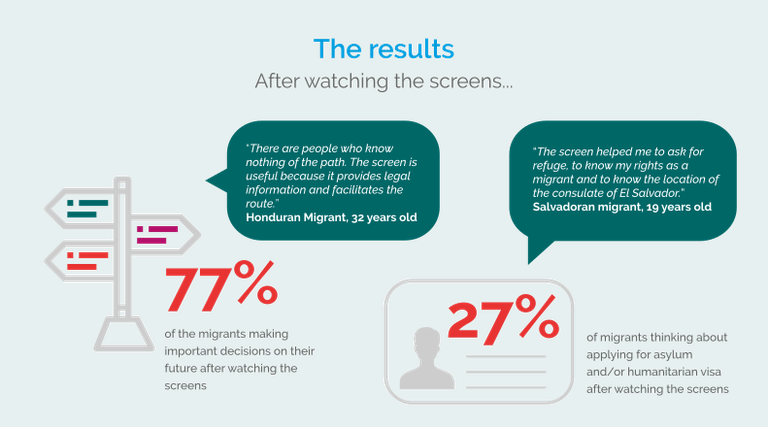“The screen helped me to ask for refuge, to know my rights as a migrant and to know the location of the consulate of El Salvador” Salvadoran migrant, 19 years old.
69% of the migrants who participated in the assessment travel without a phone and for around 80% of them, television is the source of information to which they are used in their country of origin. The technical solution developed by TSF proved thus to be perfectly suitable for the context and the beneficiaries’ needs: it provides them with information on the move they could not receive otherwise and through a system with which they are familiar.
The information displayed on the screens is gathered from trusted sources, including the United Nations agency for Refugees (UNHCR), the International Committee of the Red Cross (ICRC) and Médecins du Monde. The presentations inlcude self-care and safety advice, information on migrants’ rights, asylum procedures, humanitarian services, news and alerts. This content resulted to be in line with the beneficiaries’ needs, which are mainly related to security conditions in Mexico, humanitarian aid and legal information. This relevance is backed up by the percentage of important decisions made: out of the 15,000 migrants who benefited from the project, an average of 77% of them made important decisions after watching the screens. The evaluation also showed a steadily increasing percentage of migrants (from 16% in July 2018 to 27% in September 2018) who thought about applying for asylum or visa after watching the screens.

The feedback received from the shelters’ managers backs up these positive results. The screens have been working for over 90% of the scheduled time, showing not only the quality of the technical solution, but also the engagement of the local partners. They all agree on the need to install the same system in other shelters and would recommend the service without hesitation.
“The project is useful because sometimes people ignore the route or the rights they have when they are in Mexican territory. The screen gives them information that sometimes we do not know ourselves” Antonio Hernández. REDODEM’s Database Responsible. Casa Jtatic, Palenque.
TSF is active in the Central American migratory context since 2012. The current situation in the region is daunting, migrants are leaving their home countries in Central America (in particular Honduras, Guatemala and El Salvador) due to lack of employment opportunities, high violence rates and the consequences of the increasingly frequent natural disasters affecting the region. The migrant caravan with thousands of migrants fleeing these difficult conditions in the pursuit of a better future has arrived at the US –Mexico border after travelling more than 4,000km across Central America. They often leave behind their families, children and parents in their strife for a better future. They leave without equipment or resources and without clear information on their journey and rights.
In view of this context and the positive results of the pilot project, TSF is now working on its extension to other shelters along the migratory route and on the enhancement of the technical solution. New formats, reduced use of text and more graphic content will be introduced to allow persons with reading difficulties to fully make use of the information provided, which will be also further tailored to each location. In addition, the graphic interface for content management will also be improved to show screen availability statistics in real time and to allow automatic alerts when the screens are not operational.
Thanks to these improvements, a larger number of migrants will have access to even more relevant and tailored information, which will allow them to remain safe and make informed decisions on their future.

